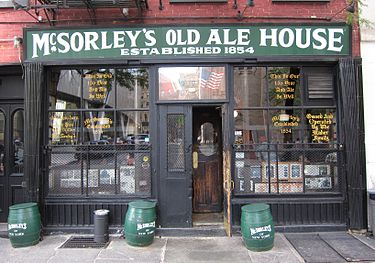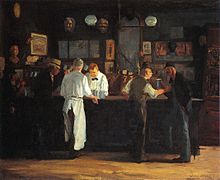- McSorley's Old Ale House
-
Coordinates: 40°43′43″N 73°59′23″W / 40.72871°N 73.98974°W
McSorley's Old Ale House, generally known as McSorley's, is the oldest "Irish" tavern in New York City.[1] Located at 15 East 7th Street in the East Village neighborhood of Manhattan, it was one of the last of the "Men Only" pubs, only admitting women after legally being forced to do so in 1970.[2][3]
The aged artwork, newspaper articles covering the walls, sawdust floors, and the Irish waiters and bartenders give McSorley's an atmosphere that many consider, correctly or not, reminiscent of "Olde New York." No piece of memorabilia has been removed from the walls since 1910, and there are many items of "historical" paraphernalia in the bar, such as Houdini's handcuffs, which are connected to the bar rail. There are also wishbones hanging above the bar; supposedly they were hung there by boys going off to World War I, to be removed when they returned, so the wishbones that are left are from those that never returned.[4]
Two of McSorley's mottos are "Be Good or Be Gone", and "We were here before you were born". Prior to the 1970 ruling, the motto was "Good Ale, Raw Onions and No Ladies"; the raw onions can still be had as part McSorley's cheese platter.
New York magazine considered McSorley's to be one of New York City's Top 5 Historic Bars.[2]
Contents
History
Founding
McSorley's has long claimed that it opened its doors in 1854; however, historical research has shown that the site was a vacant lot in 1861.[5]
The evidence for the 1854 date was considerable, but second-hand. A document at the Museum of the City of New York from 1904, in founder John McSorley's hand, declares it was established in 1854, and a New York Tribune article from 1895 states it "has stood for 40 years. . . " a short distance from Cooper Union.[citation needed] A 1913 article in Harper's Weekly declares that "This famous saloon ... is sixty years old."[6]
According to a 1995 New York Times "Streetscapes" article by Christopher Gray,[1] the census taker who visited the Irish-born McSorley in 1880 recorded the year the founder of the pub first arrived in the United States as 1855, but immigration records show that he arrived on January 23, 1851, at the age of 18,[7] accompanied by Mary McSorley, who was 16.[8] When confronted with the fact that the 1880 census did not contain this entry, Gray corrected it to 1900 in his book. John McSorley first appeared in city directories in 1862, and the building his bar occupies was built no earlier than 1858, according to city records.[1]
Opened to women
Women were not allowed in McSorley's until August 10, 1970, after National Organization for Women attorneys Faith Seidenberg and Karen DeCrow took their discrimination case against the bar to District Court and won.[9] It did so "kicking and screaming."[10] With the ruling allowing women to be served, the bathroom became coed. Sixteen years later, a ladies room was installed.[11]
Notable patrons
Many notable people have visited McSorley's, including Abraham Lincoln, Teddy Roosevelt, Peter Cooper, Boss Tweed, and Woody Guthrie. Literary figures like Brendan Behan, Paul Blackburn, LeRoi Jones, Gilbert Sorrentino, George Jean Nathan have been cited as regulars.[citation needed]
In his 1923 poem "I was sitting in mcsorley's," poet E. E. Cummings described McSorley's as "the ale which never lets you grow old." He also described it as he describes the bar as “snug and evil.”[12] McSorley's was the focus of several articles by New Yorker author Joseph Mitchell. One collection of his stories was entitled McSorley's Wonderful Saloon (1943).
After the New York Rangers hockey team won the Stanley Cup in 1994, they took the cup to McSorley's and drank out of it; the resulting dent caused the NHL to take the trophy back for several days.[citation needed]
Other locations
McSorley's Old Ale House has no other locations, however, a company called Eclipse Management has opened three McSorley's Ale Houses in Hong Kong and Macau "based loosely on the appearance of the original McSorley's Ale House in lower Manhattan, NYC". These bars sell McSorley's Ale, but are not associated in any way with McSorley's.
In popular culture
- In the comic book Preacher, the character Cassidy recounts having spent a number of years frequenting McSorley's.
- McSorley's is used as a filming location in the 1991 film The Hard Way.
- In Sergio Leone's 1984 film Once Upon A Time in America, the bar in which the five young gang members debate whether to take the dollar the bartender offers them to burn the newsstand or roll the drunk, was filmed inside McSorley's. A different bar was used for the exterior shots.
References
- Notes
- ^ a b c Gray, Christopher (November 19, 1995). "The Bridge Cafe: On the Trail of New York's Oldest Surviving Bar". The New York Times. http://www.nytimes.com/1995/11/19/realestate/streetscapes-the-bridge-cafe-on-the-trail-of-new-york-s-oldest-surviving-bar.html. Retrieved September 8, 2009.
- ^ a b Dwyer, Kevin (June 5, 2005). "Blasts from the Past". New York. http://nymag.com/nymetro/nightlife/barbuzz/11924/. Retrieved March 13, 2010.
- ^ Seidenberg v. McSorleys' Old Ale House, Inc., 317 F.Supp. 593 (S.D.N.Y. 1970).
- ^ Barry, Dan (April 6, 2011). "Dust Is Gone Above the Bar, but a Legend Still Dangles". New York Times. http://www.nytimes.com/2011/04/07/nyregion/07wishbone.html?hp. Retrieved April 7, 2011. "Joseph Mitchell, the inimitable chronicler of old New York, once wrote that the founder, John McSorley, simply liked to save things, including the wishbones of holiday turkeys. But Mr. Maher, who has worked at McSorley’s since 1964 — he predates some of the memorabilia — insists that the bones were hung by doughboys as wishful symbols of a safe return from the Great War. The bones left dangling came to represent those who never came back."
- ^ White, Norval & Willensky, Elliot (2000). AIA Guide to New York City (4th ed.). New York: Three Rivers Press. ISBN 0812931076. p.171
- ^ Harper's Weekly Oct. 25, 1913, p.15
- ^ McSorley Surname : Irish Immigration to America
- ^ Irish Immigration Passenger Record Data: January 23, 1851.
- ^ Seidenberg v. McSorleys' Old Ale House
- ^ Lichtenstein, Grace (August 11, 1970). "McSorley's Admits Women Under a New City Law". The New York Times. http://select.nytimes.com/gst/abstract.html?res=F20710FE3B5C1B7493C3A81783D85F448785F9. Retrieved March 13, 2010.
- ^ "Tour" from McSorley's website
- ^ E.E. Cummings Poem (added by Vincent McSorley)
External links
Categories:- East Village, Manhattan
- Drinking establishments in Manhattan
- Restaurants in New York City
- Historic bars of New York City
Wikimedia Foundation. 2010.



